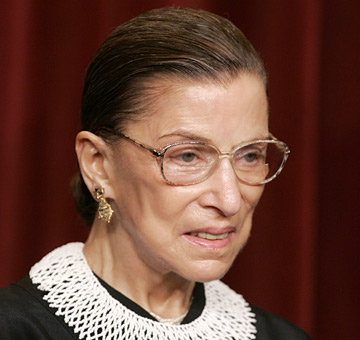The New York Times editorial board called United States Supreme Court Justice Ruth Bader Ginsburg’s comment that Roe v. Wade “moved too far, too fast” a misreading of the ” legal and political landscape at the time of the Roe decision” in a Wednesday editorial. The board also denounced opponents of marriage equality for exploiting Ginsburg’s words as a cautionary tale for the high court’s rulings on the Defense of Marriage Act and Proposition 8.
The court decision in Roe did not “short-circuit” a political process at the state level to legalize abortion, nor did it “get too far ahead of public opinion.” Instead, the Times argues (emphasis mine):
The real story, as explained by Linda Greenhouse, a former New York Times reporter who now teaches at Yale Law School, and Reva Siegel, a professor there, is that political conflict over abortion was escalating before the Roe decision, and that state progress on decriminalization had reached a standstill in the face of opposition from the Roman Catholic Church.
In 1970, a measure legalizing abortion in New York cleared the State Assembly by just a single vote. Only a veto by the state’s Republican governor, Nelson Rockefeller, blocked its partial repeal two years later. Had the Supreme Court waited for the states to move, women in a large portion of the country would still be denied the fundamental right to make their own childbearing decisions.
The claim that the court invited a backlash by getting too far ahead of public opinion does not hold. At the time of the ruling, a Gallup poll showed a substantial majority of Americans favored letting the abortion decision be made “solely by a woman and her physician,” with more Republicans than Democrats in favor. In fact, at the confirmation hearing for Justice John Paul Stevens in 1975, not a single question about Roe v. Wade was posed.
Going on to cite the toxicity of the abortion debate even in the pre-Roe era, the Times calls the current political climate around women’s reproductive rights something that was “cultivated and nourished” by Republican strategiests — not the 1973 Supreme Court ruling.
Returning to the issue of extending equal rights and equal protection under the law to gay couples and their families, the Times concludes:
But there is a danger now that overblown fears of a backlash based on a false reading of politics before and after Roe v. Wade could lead the Supreme Court to shy from doing as it should — enforcing equal protection by declaring same-sex marriage a constitutionally protected right in every state.
The short version? Then, as now, fear of anger from opposition groups or further polarization is no reason to deny people their rights.

